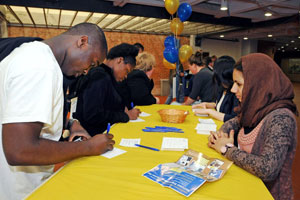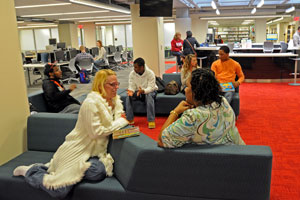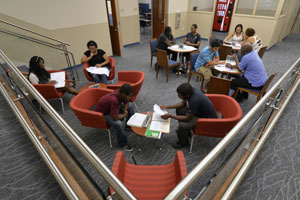Expectations of Students
Behavioral and Cultural Expectations
Being in a new environment is not easy. Individuals face different sets of expectations and challenges in post-secondary academic environments or when studying abroad.
Remember: talk it out. Students who feel bothered, stressed, confused, worried, or otherwise not well-equipped to succeed should tell someone. This someone can be a friend, counselor, roommate, host family, advisor, professor, tutor, librarian, or anyone else that will listen. It is important to express yourself and communicate how you are feeling. Following this advice will increase your chances for success as you complete your studies.
For full rules about expections of being a successful student, carefully read these links:
See these bulleted points for some quick pointers about cultural differences that you might face in your classes:
- Professors expect class participation and even grade it. Study for your classes and be prepared to talk about your studies. Participate by asking your teachers questions and paying attention. Silence is often misunderstood for a lack of interest.
- Respect individuals and opinions. Professors will not permit any student to make fun of any other student. Delaware County Community College does not tolerate a lack of respect to any person, no matter their economic or social standing, race, ethnicity, religious beliefs, or sexual orientation. You are entitled to respect; please show this same consideration to others.
- Students must attend class regularly. It is important to review the attendance policy of your classes, visa, and/or financial aid award.
- Ask your professor for help if you are struggling in the class. Some professors may offer extra credit.
- Address professors by their formal names (“Dr. Delaware,” not “Joan”) unless they ask you to call them something else. This includes speaking, writing, and e-mails.
- Dress: It is common in the United States for some professors and students to wear informal clothing to school.
- Professors are busy. Read the syllabus before you ask questions that can be answered on the syllabus.
- Record keeping: Keep all syllabi for at least one or two years.
- Expect many small assignments due within a short period of time. In an American college course, there are typically assignments given each week to assess ongoing learning.
- Independent thinking is valued. Americans value independent thinking.
- Students must take responsibility for themselves. Ultimately, it is your responsibility to ensure that you are in good status financially, academically, and with Immigration.
- If students wish to dispute a grade, they should communicate politely but openly with the professor. Students should not expect their advisors, or anyone else other than the professor and his or her superiors, to assist in altering a grade.
- Showing appreciation is important in the U.S. and Americans expect to hear the word “Please” when you ask for help. They also expect to hear the words “Thank you” after they help.
- Punctuality, or being on time, is important in the U.S. Do not be late for appointments or for your classes. If you are late, you send the message to your professor, instructor or advisor that you do not take your course or your appointment seriously. Value others’ time.
- Communicate well with teachers and advisors. Make appointments when necessary. Never demand something from your teachers, advisors, or other employees at Delaware County Community College. You would do best to not say, “I need you to do this for me…” or “I want you to help me now.” Instead, try, “Could you please help me with this?”
- Plagiarism is using – on tests and in written form – someone else’s answers, words, or ideas, and pretending that they are your own. It can be like copying someone else’s words or answers. Plagiarism will not be tolerated. It is stealing and may result in disciplinary action against you. If you are wondering whether something is plagiarism, ask your professor, instructor, or tutor. See the official Academic Dishonesty Policy above.
- Similar to plagiarism, cheating is using another person’s effort and talent for your own personal gain – with or without that person’s permission – as if his or her efforts were yours. Cheating is also stealing and may result in disciplinary action against you. See the official Academic Dishonesty Policy above.













